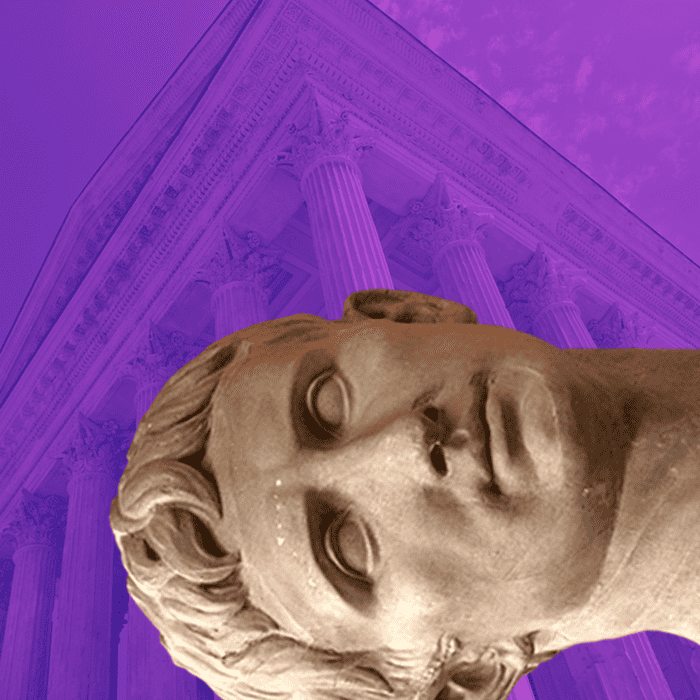Exploring the evidence that the works of Shakespeare were written by Edward de Vere, 17th Earl of Oxford
Exploring the evidence that the works of Shakespeare were written by Edward de Vere, 17th Earl of Oxford
The Shakespeare Plays / Julius Caesar
Killing him seemed like a good idea
at the time….
Part historical drama, part anatomy of a political seduction (which the Earl of Oxford knew about first-hand), Shakespeare’s Julius Caesar presents the noble Brutus fearing a return of the Roman Republic to a tyrannical monarchy. He agrees to an assassination plot against the heroic Julius Caesar. After the butchery – with Brutus deluded into thinking the people will cheer the snazzy motto, “Enfranchisement!” – Caesar’s friend Mark Antony whips the fickle crowd into a crazed mob, joins forces with Caesar’s successor Octavius, and hunts down the two main conspirators: Brutus and Cassius. Seeing no way out, each of these assassins kills himself, and (by the way) they end up being two of the three guys Dante places in the mouths of Satan for all eternity. Point taken?
A few of the questions we seek to illuminate:

Why is Julius Caesar such a staple in secondary school curricula?
Why is the play focused more on Brutus than on Caesar?
How do we explain the anachronisms and contradictions concerning time?
What differences in the last two acts leave most audiences feeling disappointed?
Professor Michael Delahoyde walks us through Julius Caesar, act by act! Replay video coming soon.
In the tragedy Julius Caesar, Shakespeare explores the conspiracy against the Roman dictator Julius Caesar, his assassination, and its aftermath. The play opens with the citizens celebrating Caesar’s triumphal return to Rome after battle. However, not everyone is pleased with Caesar’s growing power, including Cassius, who deviously works on Brutus’ unspoken fear that Caesar’s ambition will lead to tyranny.
Cassius convinces Brutus to join a conspiracy to assassinate Caesar for the sake of Rome’s freedom. Despite his conflicted feelings towards Caesar, Brutus ultimately agrees, believing it is for the greater good of Rome. The conspirators carry out the assassination on the Ides of March, stabbing Caesar to death in the Senate.
Following Caesar’s death, Rome descends into chaos. Despite Brutus’ attempt to justify the assassination to the crowd, Mark Antony, Caesar’s loyal friend, delivers a powerful funeral oration that turns the Roman citizens against the conspirators. A civil war erupts between Antony and Octavius Caesar (Julius Caesar’s adopted heir) on one side, and Brutus and Cassius on the other.
The conflict comes to a head at the Battle of Philippi. Cassius, mistakenly thinking his soldiers have been lost, kills himself. Rather than face capture, Brutus also chooses to take his own life, believing he has acted honorably for the good of Rome. The play ends with Antony recognizing Brutus as “the noblest Roman of them all,” despite their differences and the tragic outcome of their conflict.
Julius Caesar can be dated to any time between 1579, publication of Thomas North’s Plutarch, and 1599, when a performance at the Globe was recorded.
What works inspired the author?
Plutarch’s The Lives of the Noble Greeks and Romans, 1579 translation by Sir Thomas North
Cicero’s Philippics
De Republica Anglorum by Thomas Smith
The Histories of Trogus Pompeius by Arthur Golding
Michael Delahoyde, Julius Caesar Overview and Act by Act.
Visit the website of Professor Michael Delahoyde, host of our series, for an act by act analysis and full treatment of Oxfordian themes in the play.
Prechter, Robert Jr. More Evidence That Julius Caesar dates to 1583. Shakespeare Matters 12.1 (Winter 2013): 24–25.
Gilvary, Kevin. The Life and Death of Julius Caesar. Dating Shakespeare’s Plays. Tunbridge Wells, UK: Parapress, 2010. 356-367.
Garcia, Emmanuel E. The Two Cinnas: A Covert Allusion to the Two Shakespeares?. Shakespeare Oxford Newsletter Vol. 53/2 (Spring 2017), 30.
Sign up to our free email news mailing list to get invitations to attend Shakespeare Illuminated live!
Shakespeare Illuminated relies on the generosity of donors. To support Shakespeare Illuminated, or pick a play to sponsor, please contact us at info@shakespeareoxfordfellowship.org.
| Cookie | Duration | Description |
|---|---|---|
| cookielawinfo-checkbox-analytics | 11 months | This cookie is set by GDPR Cookie Consent plugin. The cookie is used to store the user consent for the cookies in the category "Analytics". |
| cookielawinfo-checkbox-functional | 11 months | The cookie is set by GDPR cookie consent to record the user consent for the cookies in the category "Functional". |
| cookielawinfo-checkbox-necessary | 11 months | This cookie is set by GDPR Cookie Consent plugin. The cookies is used to store the user consent for the cookies in the category "Necessary". |
| cookielawinfo-checkbox-others | 11 months | This cookie is set by GDPR Cookie Consent plugin. The cookie is used to store the user consent for the cookies in the category "Other. |
| cookielawinfo-checkbox-performance | 11 months | This cookie is set by GDPR Cookie Consent plugin. The cookie is used to store the user consent for the cookies in the category "Performance". |
| viewed_cookie_policy | 11 months | The cookie is set by the GDPR Cookie Consent plugin and is used to store whether or not user has consented to the use of cookies. It does not store any personal data. |